Telecom
Nigerian Institution of Metallurgical, Mining and Materials Engineers (NIMMME or 3M) hosts Fellowship Ceremony & Honours Illustrious Nigerians
Nigerian Institution of Metallurgical, Mining and Materials Engineers (NIMMME also called 3M), a Division of the Nigerian Society of Engineers (NSE) has honoured Nigerians for their illustrious contributions to the growth of Metallurgical and Mining industry in Nigeria.

The Institution bestowed the honourary award during the 2nd public lecture themed; “Ezekwe-Barberopoulos-Obikwelu (EBO) Honourary Lecture” held on Friday 1st December 2023 at the transmission company of Nigeria hall, in Abuja.
The public lecture christened after three illustrious individuals, namely Prof Gordian Ezekwe, Mr. Romeo Barberopoulos and Prof D.O.N. Obikwelu was aimed at rewarding Nigerians with stellar contributions to the industry.
The Highlights of the event came when each of these Individuals were honoured and they all had someone who spoke on their behalf.
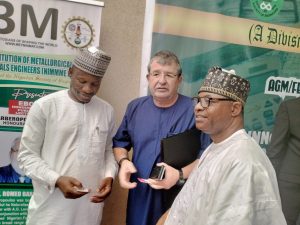
Prof Onwue Abdulmalik Ibrahim R and Barberopoulos and Dr. Ibrahim Agava
Vassily Barberopoulos, the son of Romeo Barberopoulos, who delivered a keynote speech, spoke on behalf of his late Father.
It would be recalled that Late Romeo Barberopoulos established and ran the leading metals foundry in West Africa in 1969 after being one of the engineers to set up Africa’s first TV Station WNTV Ibadan, during his time with Leventis Group.
His Son, Mr. Oye Vassily Barberopoulos (The current MD) is more Nigerian than most of us and knows all corners of the country and has taken the company to new heights in mining, oil and gas and machine parts among others.
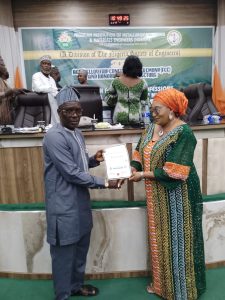
He is an authority in Additive Manufacturing (especially 3D printing) in Africa and took us through the opportunities and threats to existing fabrication industries, National during the 2nd Ezekwe-Barberopoulos-Obikwelu EBO Honourary Lecture. keeping the inspiration of the greats alive
Similarly, Professor Onwue Abdulmalik Ibrahim, a Research Director at NASENI, Abuja HQ spoke as Guest Lecturer for Prof Gordian Ezekwe.
Prof Onuwe started by explained how Late Prof Gordian Ezekwe hired him not caring where he came from but that he won NYSC prize as a pioneer staff of NASENI (which Prof Ezekwe founded during the IBB era).
How he worked with him closely in drafting, welding, fitting in the workshop even on Sundays, bringing innovations and ideas to life.
And how Prof. Ezekwe mentored him to a sterling career at NASENI passing through many departments and subsidiaries coming from OND and is a full Professor of Mechanical Engineering today.
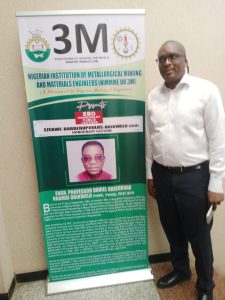
Michael Orekyeh by Prof Obikwelu Banner
He talked of NASENI and its drive for local capabilities and manufacturing and its willingness to partner with 3M and NSE on research and other activities to drive technology in Nigeria.
Also, Late Prof. Gordian Obumneme Ezekwe, an illustrious son of Abagana received a post- humous award from Nigerian Institution of Metallurgical, Mining and Material Engineers during the ceremony.
The President Umuada Abagana National Association Iyom Dr. Mrs Ajia Ogugua Agagbo received the award on behalf of his family.
Late Prof. Gordian Obumneme Ezekwe was a Nigerian inventor, mechanical engineer and former Federal Minister of Science and Technology under General Ibrahim Babangida from 1989 to 1991.
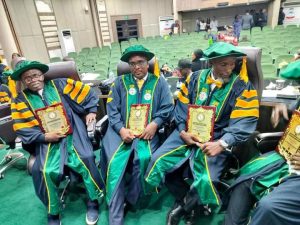
He was a former Director of the Projects Development Agency (PRODA) (later renamed Institute), founder and first Vice Chairman/ Chief Executive of the National Agency for Science and Engineering, Infrastructure (NASENI) and founder of Science Equipment Development Institute (SEDI). Prof. Gordian Ezekwe was the first Nigerian PhD in Mechanical Engineering (1959).
Earlier, Dr. Friday I Apeh (a Director in NIBRRI) a Past National Chairman of 3M, spoke as Lecturer on behalf of Prof Daniel O.N. Obikwelu.
Prof. Obikwelu who was unavoidably not able to make the event, though he participated fully during the 1st Edition of the Ezekwe-Barberopoulos-Obikwelu EBO Honourary Lecture held in Awka, Anambra State 2022.
He is an award-winning student and researcher at the Michigan State University having done work for NASA and The US Navy. He worked in Delta Steel Company (DSC) Aladja, Shell Petroleum Development Company (SPDC) helping set up the SITP program that trained hundreds of Engineers in hands on Technology and also established Metallurgical Engineers as a distinct discipline in Shell HR and enable Metallurgy graduates work in Shell.
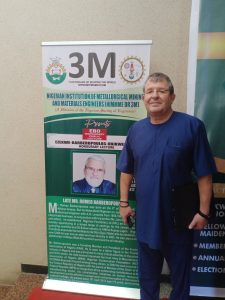
He worked at Nnamdi Aziliwe University, ESUT and the University of Nigeria Nsukka UNN, where with the help of the then VC, Prof Chinedu Ositadinma Nebo (Former Minster of Power) they set up the Metallurgical and Materials Engineering department at UNN. He was conferred Fellow of NIMMME.
The Institution executed new Membership Induction of over 110 inductees, 47 Fellows and 2 Honourary Fellows.
Such Fellows included
1) Prof Samson Duna DG NIBRRI (Nigerian Building and Road Research Institute)
2) Prof Hussaini Doko Ibrahim DG RMRDC (Raw Materials Research and Development Council)
3) Prof Chinedu Nebo form Minister of Power and current VC University on the Niger Onitsha
4) Mr. Obadiah Nkom DG Mining Cadastre Office , Abuja
5) Prof Adisa Ademola Bello Registrar COREN
6) Prof DON Obikwelu
7) Engr Jacob Titilope Adeyemo MD GeoCardinal Engineering
8) Prof AbdulGaniyu Funsho Alabi a Past National Chairman
9) Prof Aje Tokan the current National Chairman
10) Engr Michael Orekyeh of the Anambra State Ministry of Works
11) Engr Valerie Agberagba a General Manager at NDPHC
Other Fellows Conferred at the event included.
1) Engr Henry Bolarinwa
2) Prof David Esezobor
3) Engr Chinasaokwu Okorie
4) Engr Joseph Gansallo
5) Engr Sunday Agbalajobi
6) Engr Oduche Azih
7) Engr Kennedy Ibechem
8) Prof Leke Oluwole
9) Engr Ikenna Okonkwo (a Manager in NNPC)
10) Engr Fidelis Ezenwankwo MD Castmaster Ltd Kano
11) Engr Tafa Abubakar Quarry Manager BUA Cement
12) Engr Abdulraman Ottan
13) Prof Abdul Rahman Asipita Salawu of FUT Minna
15) Prof Jamiu Kolawole Odusote of Unillorin
16) Engr Ese Ochoga a Past Chairman
17) Engr Joy Ogbodo of SEDI Enugu
18) Prof Yusuf Shuaib-Banata of Unillorin
19) Engr Ayodele Mesaiyete of Lagarge Wapco
20) Engr Yahya Bukar a Director in Standards Organization of Nigeria
21) Engr Christian Onyibo a Director in Federal Ministry of Work, Abuja
The event was graced by many Dignitaries in the NSE and COREN space such as Engr Ali Rabiu MFR – immediate past President COREN, Vice President North Central Engr Joseph Adebayo, who represented the NSE President Engr Tasiu Saad Gidari-Wudil FNSE, National EXCO members, Branch Chairmen and many others.
Diran Onifade, a veteran Broadcast journalist was the Moderator of the event.
Telecom
Glo 1 Reaches 8-year Milestone of Continuous Connectivity
Glo 1, the international submarine cable wholly owned and operated by digital and telecom services company, Globacom, has marked eight years of uninterrupted connectivity, from 2016 to date.

Throughout this period, it has maintained an excellent record in the provision of internet access for both customers in Nigeria and across Africa. It lived up to expectations in March, this year during the widespread internet disruptions as result of cuts to other submarine cables in Nigeria and West Africa.
Glo 1 was functioning all through, providing normal operations to financial institutions, internet service providers, and data consumers.
The resilience of the facility has been attributed to its robust construction and durability by industry experts.
To further enhance its capabilities, Globacom has upgraded the Glo 1 submarine fiber cable infrastructure, optimizing its utilization and service delivery, leading to provision of direct, low-latency connectivity to London and ensuring ultra-fast and reliable internet access.
The upgrade further complements Globacom’s continuous network expansions and upgrades, targeted at ensuring customers’ unique calling and browsing experiences.
Reiterating the capacity of Glo 1 to provide tailored solutions to meet the diverse needs of various clients across different sectors of the economy, including oil and gas, manufacturers, government institutions, educational establishments, and medical facilities, Globacom explained that the cable supports key applications such as teleconferencing, distance learning, disaster recovery, and telemedicine, benefitting communities across Africa.
Globacom has sole ownership of the entire Glo 1 infrastructure, spanning access systems, national fiber-optic backbone, international gateways, international cable networks, and data center services. The comprehensive ownership enables Globacom to offer Glo 1 clients a unique advantage through last-mile and domestic long-haul services, as well as wide presence and fiber-optic networks.
Telecom
Airtel Africa’s Revenue Drops 16%, Records $7M Net Profit in Q1 of 2025
Airtel Africa has reported a consolidated net profit of $ 7 million for the first quarter of its 2025 financial year ending June 2024 against a $ 170 million loss in the year-ago period.

Its net profit was primarily impacted by the $ 80 million of exceptional derivative and foreign exchange losses (net of tax) and lower Ebitda due to significant currency devaluation across key markets, Airtel Africa said.
It had reported a loss of $ 91 million for the fourth quarter ended March 2024 on account of tax impact and forex loss.
“Strong fundamentals and focussed execution continue to support operating performance despite challenging macro-economic environment,” the company, which operates in 14 African countries, said.
The company’s consolidated revenue fell 16 per cent in Q1 FY25 to $ 1,156 million from $ 1,377 million a year ago.
The decline in revenue reflects the impact of currency devaluation, particularly in Nigeria, the company said.
“We have initiated a comprehensive cost optimisation programme across the Group. We have already seen success in this project, with savings arising in network and distribution costs, and continued opportunities as contract renegotiations continue. We expect sustainable savings to continue as the year progresses,” said Airtel Africa CEO Sunil Taldar.
Airtel Africa has fully repaid the outstanding debt due at the HoldCo during Q1, he said, adding that the company is trying to further reduce foreign currency exposure to limit the impact of currency devaluation on the business.
“The growth opportunity across our markets remains compelling, and we continue to focus on margin improvement as indicated in our FY24 results,” Taldar said.
The company’s Ebitda margins tanked to 45.3 per cent from 49.5 per cent in the year-ago period.
“Reported currency trends were clearly impacted by the FX headwinds across some of our markets, particularly in Nigeria and Malawi. This contributed to a reported Group revenue and Ebitda decline of 16.1 per cent and 23.3 per cent, respectively, in Q125,” the company said.
Its total customer base grew by 8.6 per cent to 155.4 million.
“Data customer penetration continues to rise, driving a 13.4 per cent increase in data customers to 64.4 million. Data usage per customer increased by 25.1 per cent to 6.2 GBs, with smartphone penetration increasing 4.7 per cent to reach 41.7 per cent,” the company said.
Telecom
ITU Ranks Nigeria High in Digital Transformation Readiness
A new report of the International Telecommunications Union (ITU) has ranked Nigeria very high at 71 per cent, in comparative legal, policy and governance frameworks towards G5 – advanced state of readiness for digital transformation known as G5 with Germany, Finland and Singapore leading the global chart.

In the report conducted by the ITU, the United Kingdom’s Foreign, Commonwealth & Development Office (FCDO) and the Nigerian Communications Commission (NCC), and unveiled by Nigeria’s Minister of Communications, Innovation and Digital Economy, Dr. Bosun Tijani in Abuja on Monday, Nigeria was ranked among Africa’s top seven BEMECS 5G Readiness Index, which represents the country’s readiness to deploy and adopt mass-market 5G networks.
Titled, Collaborative Regulation: Accelerating Nigeria’s Digital Transformation, and presented at the Digital Economy Complex, Mbora, Abuja by ITU’s Kagwira Nkonge, the report, among other things, presented a case study for ‘collaborative regulation review to assess and support Nigeria’s transition towards collaborative digital governance, evidence-based policy making and agile regulation in the digital economy”.
The report, which was presented to a cross section of key industry stakeholders including service providers, government agencies, representatives of multilateral institutions, West Africa Telecommunications Regulators Assembly (WATRA), Africa Telecommunications Union (ATU), among others, was also designed to complement existing cross-country benchmarks in which features of countries policy and regulatory environment are assessed.
The features of countries policy and regulatory environment are assessed according to the pillars of the Generations of Regulation frameworks which tracks telecom regulatory maturity towards digital transformation readiness, designated at G5 Advanced State of Readiness”, and for which Nigeria currently stands at G4.
Advanced State of Readiness is benchmarked against four critical levels of accomplishments which include national collaborative governance, policy design principles, digital development toolbox, digital economic policy agenda, with Nigeria scoring 91 per cent in regulatory capacity; 82 per cent in Market Rules; 81 per cent.
For further inquiries: Director Public Affairs Department, Nigerian Communications Commission Plot 423 Aguiyi-Ironsi Street, Maitama, Abuja email: [email protected] Tel: +234-90204617325, +234-8051110337 in Collaborative Governance; 76 per cent in Legal Instruments for ICT/Telecom markets; 69 per cent in National Digital Agenda Policy, among other benchmarks.
Dr. Tijani, in his remarks at the event, commended the ITU and partner agencies and consultants that actualised the report; and expressed Federal Government’s commitment “to utilise this report as a navigational aid towards attainment of our regulatory objectives and policies outlines towards achieving a robust digital
economy”.
“That is what we will continue to do as a government, ensuring that we can put ourselves in a place to have cutting-edge modern regulations in place to ensure that business is done properly in our sector and to ensure that, where possible, increase the local content of the sector as well,” he said.
Dr. Tijani noted that NCC has adapted over the years in response to how its role and mandate have changed. He explained, “Fifteen, twenty years ago, NCC was just regulating the telecommunications sector, today, NCC regulates the foundation for which any economy would be prosperous.”
The Executive Vice Chairman of the Nigerian Communications Commission, Dr. Aminu Maida, who hosted the presentation, welcomed the indicators that promote effective regulation, attraction of greater investment, and development of innovative models for broader digital inclusion.
He emphasised that collaborative regulation would support Nigeria’s transition towards effective digital governance, evidence-based policy making and agile regulation in the nation’s digital economy.

 News1 day ago
News1 day agoOsun, Delta Fine Google, Meta $350m Each for Alleged Tax Evasion

 News2 days ago
News2 days agoUniversity Don Urges Stricter Copyright Enforcement to Combat Music Piracy

 Telecom2 days ago
Telecom2 days agoKuda partners with SeerBit for safe and quick cardless payments online

 Telecom2 days ago
Telecom2 days agoNigerian Fintech Firm Risevest Set to Acquire Kenyan Stock-trading App Hisa

 Telecom2 days ago
Telecom2 days agoNetflix Jacks Up Subscription Price By 40% in Nigeria

 Telecom2 days ago
Telecom2 days agoMTN Nigeria Launches First Fully Digitised Retail Store in Sub-Saharan Africa

 Telecom2 days ago
Telecom2 days agoMercury Bank Blocks Accounts Linked to Nigerian Startups, Others

 Telecom1 day ago
Telecom1 day agoGlo 1 Reaches 8-year Milestone of Continuous Connectivity





























